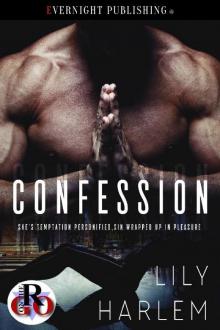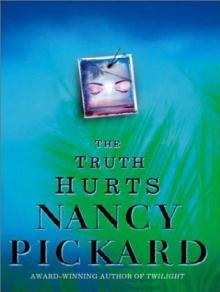- Home
- Nancy Pickard
Confession Page 2
Confession Read online
Page 2
“Please,” the boy said in a more courteous tone.
I relaxed a little.
He had a mature-sounding baritone voice with a familiar timbre, and I wondered where I had heard it before.
“Whom shall I say … ?”
The kid’s gaze shifted away from me, and the right side of his mouth lined in a secretive-looking half smile, as if he found my question bitterly amusing.
“The lieutenant went to school with my parents.”
“Oh?” I said.
I looked at the latch that hooked the screen door to the house. Locked. When I did that, I saw that he was holding a large book that looked like a scrapbook. It was pink as a prom dress, stuffed with clippings whose edges stuck out like petticoats. I looked back up at him. It was clear that he didn’t want to give me his name.
“I’ll get him,” I said.
I thought he nodded, but it was hard to tell in the glare of the sun.
Sweat coated the backs of my knees and trickles of it ran down inside my T-shirt as I moved back into the house and pushed through our swinging door into the kitchen. I saw that our back door was wide open. I walked over to it quickly and closed and locked it. Then I leaned down into the basement stairwell and called softly, “Geof! Can you come up? There’s a boy here to see you!”
In a moment he appeared at the bottom of the steps.
“Who’s here?”
He looked surprised and hot and annoyed, although not with me. We didn’t get drop-in visitors very often out where we lived, which was one of the reasons we’d bought the place. Our dirt and gravel roads made visitors fret about their tires and paint jobs, and we were nearly inaccessible in snow. It wasn’t only that we liked the privacy and solitude but also that Geof-the-cop felt anonymous and unreachable thirty miles outside of town.
“It’s a kid,” I said, looking down fondly at the half-naked man at the bottom of the stairs, at the curly graying brown hair on his head and chest, his beefy shoulders, his long, muscular legs, and his big bare feet on the cool cement floor. Just seeing him there in all his solid, aggressive maleness made me feel better, safer, more secure. He was wearing his favorite summer weekend attire: a pair of old red boxer swim trunks. “A teenager. He’s got a motorcycle.”
“I didn’t hear it.”
I hadn’t either, and that bothered me. How and why did the kid approach us so silently? Had he walked the bike up to our front door? Didn’t he want us to hear him coming?
“What the hell’s he want with me?”
“I don’t know,” I said with an exaggerated patience that made him smile. “Maybe he wants to mow our yard. Maybe he’s the new kid on the paper route. He says you went to school with his parents.”
“Yeah?” He placed one hand on the railing, one foot on the first step. I felt an urgency to get him moving, to overcome his reluctance to come upstairs and go to the door. It looked like the same reluctance I’d felt when the doorbell rang first. “So who are they?”
“I don’t know.”
I felt like calling 911. Maybe I’d get a cop faster that way.
“How the hell did he find us anyway?”
“Geof! I don’t know! Will you please get up here!”
He heard my tone, took a better look at my face, and then bounded up the stairs two at a time. “Is there a problem? Why didn’t you tell me to get my ass in gear?”
“I thought I did.”
Our sweaty bodies touched as he moved past me, heading for the refrigerator, where he kept a gun on top, below the cabinets.
“Is there some problem with this kid?”
“I don’t know. I can’t tell. There’s just something weird …”
In a deliberately light tone, he said as he reached up, “So he looks like a serial killer?”
“Sure.” I played along, watching him remove his .38 from the shadows over the refrigerator. He also lifted a little .22 from out of the dusty darkness and showed it to me to remind me it was there if I needed it. “He’s here to confess to you.” I watched him check both guns for ammunition, and then lay the .22 back on top of the fridge and stick the larger gun down in the right pocket of his swim trunks where its handle stuck out in plain sight.
“Maybe it’s somebody I put in jail.”
“Uh-huh.” I lifted one of his T-shirts, a white one, off the back of a kitchen chair where he’d left it, handed it to him, and watched him pull it over his head. “That could be. Or maybe you put his father in prison, and now the kid’s going to rape and torture me before he kills you in revenge.”
“Hah,” He tugged the bottom of the shirt over the bulge and handle of the .38. In a Humphrey Bogart drawl, he said, “Tell me, sweetheart, did you have this strange sense of humor before you met me?” He patted his pocket, smiled at me, a half-cocked grin that reminded me of the boy at our front door. “So, who’s this kid really?”
I shrugged. “He looks familiar, so maybe his folks did go to school with you.”
My husband placed the palm of his right hand against my jaw and my left cheek, briefly cradling my face. His skin felt hot and damp on mine, like a facecloth in a steam room, and I leaned into its comfort “That could be half the town,” he said. “Everybody’s folks went to school with us.”
“Yeah.”
Geof and I had been four years apart at Port Frederick High School. He was the older of us, I liked to remind him, but not necessarily the more mature.
He started for the swinging door. “You stay.”
“Yes, Lieutenant.”
His smile flashed, a great full smile that cracked his stern face into equal parts mischief and wit.
“This looks like a very serious boy,” I warned him.
“No joke?” he said, and with those words, he disappeared through the swinging door into the hallway that led to our visitor at our front door. It was the last time I would ever see Geof in just that way; I didn’t know it then, but forever after that moment, my husband was never going to be the same again nor was our marriage. Ever since then, when I’ve come to a crossroads in my life, I think of that last sight of his smooth, tanned back and of a swinging door. I see it swaying, making that little creaking sound on its hinges, that ruffling sound where the edge rubs the doorsill after you’ve gone through, when the door’s still settling back into place.
We’d kept the kid waiting a long time. I wondered if he had been patient enough to stick around. I stood still and listened. The front screen door slammed softly shut. And then there was a quiet rumble of male voices moving from the vicinity of our front door into our living room. I relaxed a little. If Geof had invited the boy into our home, there was no threat. Nothing to worry about this time. I turned away from the door and started to stack the Sunday newspapers in the recycling bin. A Schubert quintet was playing softly on the boom box we kept in the kitchen; the music and chores harmonized to soothe my fears away.
3
SOON I HAD SLIPPED HAPPILY BACK INTO THE day, unlocking and reopening the kitchen door, moving in and out of the house.
Our back door led to a walkway of plain cement rectangles stuck in the dirt and grass. There was nothing manicured about our property; we let it go wild as much as possible, allowing the leaves to fall and stick, mowing only enough to keep the bugs down, coexisting contentedly with dandelions and crabgrass. Our first year, Geof planted azaleas by the front door and I stuck in flowering ground cover wherever a bare spot called to me. He had his tomato plants out by the garage and I’d scattered enough wildflower seed to germinate a small meadow. So our property was, by and large, a wild garden of surprises. We never knew what sweet little delight might pop up right at our feet to dazzle us. It could be blue cornflowers one month and black-eyed Susans the next, even carnations, or precious little wild roses with yellow hearts and snowy petals with a blush of pink. We had floral bounty to fill our fields of vision, as well as our vases, from early spring daffodils to late fall bittersweet. We were heady with honeysuckle in the summertime, and w
hen the iris bloomed—too briefly!—in the spring, it seemed I spent half my days with my nose stuck down their sweet fragrant throats. The house in the middle of all this natural beauty was timber and stone, with a real honest-to-God slate roof and a couple of chimneys. Our niece and nephew called it the Hansel and Gretel cottage, and when we moved in, it truly did seem to me like a fairy tale come true, where Geof and I had a fighting chance to live happily ever after.
So involved in my chores was I that I nearly jumped out of my skin ten minutes later when he called, “Jenny!”
I nearly dropped the half gallon of milk I was holding up in the refrigerator as I sponged a shelf. They’d been so quiet, the teenager and the cop, and I’d been puttering so happily that I’d nearly forgotten they were there.
In the manner of spouses everywhere, I yelled back, “What?”
And received no reply.
I closed the refrigerator door, straightened my shirt, and hurried in the direction of Geof’s voice. Somebody who didn’t know him wouldn’t have detected anything untoward in that single word: Jenny. It would only have been the raised voice of a husband requesting the attention of his wife in another room. Dear? Would you come in here? But I thought I heard something else in its timbre, I thought I sensed a tension and an urgency, even a plea. An unspoken message hung in the bacon-scented air between the back of the house and the front, and that word was HELP! And not just any “help” either, not come’ere and help me make the bed or help me hold this string while I tie it or help me empty the trash, but HELP ME, JENNY! As in, Help me, I don’t know how to handle this, I need you, please come quick!
I didn’t even think of grabbing the .22.
It wasn’t that kind of help. It wasn’t physical terror calling to me, it was simply, as Geof himself explained it later, “Oh, Christ, Jenny, come in here quick, I don’t know what to do! I’m in over my head, I need you …”
So I went on the trot, slowing as I neared them. I stopped in the double-wide doorway between the hall and the living room and stared in. Through the open windows I heard a bird chirp heavily as if it were complaining about the heat. The boy sat with his back to me on one of our two facing sofas, big old comfy things where we could sprawl out together or alone. He didn’t turn around at the sound of my bare feet padding on the hardwood floors, so I couldn’t see his face. I saw Geof’s well enough, though. He was leaning forward, toward the boy and me, with his forearms on his thighs and his hands clasped together between his knees. His face looked the way it appears in emergencies like homicides or car wrecks: frozen, stoic, but the eyes alert; it’s a sort of show-no-emotion facial reflex that hides his furiously operating thoughts and complex feelings he doesn’t wish to reveal at that moment. He tended to wear that face home with him from work during tough cases or particularly brutal ones, and it always took awhile for him to melt into expressiveness again. I’d also seen that look on the day, a few years before, when I’d started bleeding at the start of a miscarriage. I had called to him—much as he had just beckoned me—to come help me up from where I sat crying on the bathroom floor. It was only at that moment that I’d known I was pregnant, and it had felt strangely thrilling to think it was so and that now it was over. I’d had an odd thought that was also a fragment of a line from a T. S. Eliot poem: “well now that’s done, and I’m glad it’s over.” I’d felt sad, which surprised me, and also frightened. Later, I felt only relieved, so much relief and so strongly that I could not confess it to Geof for fear of hurting his feelings.
He waved me toward him and patted the cushion next to him. When I took that seat, our sweaty thighs stuck together. I looked across at the boy. He was separated from us by a gulf of five feet and a large square coffee table littered with books and magazines. Geof touched my knee with the palm of his left hand and left a glisten of sweat on my skin.
“Jenny, this is David Mayer.”
He pronounced it like Bayer, as in aspirin, or slayer.
“Hello,” I said, feeling foolish.
Silence unfolded around us like cards laid down, and I wondered, What game is this, and who holds aces?
“You gonna tell her?” the kid said to Geof. And then, with cold scorn, “Or you gonna make her guess?”
I suddenly really didn’t like this kid, this David Mayer.
What seemed at the time to be irrelevant thoughts flitted through my mind. In retrospect, they seem pretty damned relevant. They were thoughts almost without words, more like feelings, about what a pretty, comfortable home Geof and I had created together. Our furniture didn’t match, at least not in theory, but it fit together perfectly in practice. We’d used my favorite clear, bright colors—yellows, oranges, reds—and mixed them with his favorite deep brown wood tones, so the house had an autumnal atmosphere all year long, kind of crisp and cheerful and cozy all at once. There were always books and magazines littering the rooms like scattered leaves, and often a week’s worth of newspapers trailing from the kitchen to our bedroom upstairs into the bathrooms down to the living room and finally into recycling. And books, so many books it looked as if a convention of librarians had dropped by with armloads and joyously tossed it all up into the air and dumped everything, leaving us to sort through the detritus on our deliciously erratic quest for wisdom. From just where I sat on the couch I saw Geof’s Smithsonian and Science magazines tumbled in with my own professional journals that kept me informed about the world of trusts, foundations, and not-for-profit agencies. There was one of the couple or so novels I was reading more or less at the same time and pages from the Wall Street Journal, which I felt I had to read. Everywhere there were objects to catch our eyes; snag our brains; stimulate an idea, a conversation, a thought, an argument. There were yellow floor-length draperies that we hardly ever closed, because we achieved our privacy from our isolation and from the branches of the huge old fir trees outside our windows. There were bookcases and coffee tables and end tables and crooked lamps, an appearance of having lived there for centuries—or at least since Gutenberg invented his press—but that was misleading, since we’d only been in the cottage for a few years. It only felt like forever. All this I noticed half consciously. It was almost as if I had a sense that I wasn’t ever going to see it again quite like this; I was observing it, lovingly, longingly, like a woman going off to prison or like one who’s been given a month to live. It made my heart swell, this loving mess of a living room, and I felt a rush of totally irrational anger directed at our smart-mouthed young visitor: Leave us alone!
He, the boy, the stranger, sat in the middle of the opposite couch as if he’d taken it over. He didn’t slouch, not as I expected of teenagers. Rather, he had his spine pressed hard against the back of the couch with his feet flat on the floor, his legs slightly apart, his big hands resting on top of the incongruous pink scrapbook in his lap. He didn’t fidget. His expression was unreadable except when it expressed patronizing contempt for Geof and a sort of hostile curiosity toward me. Now, looking back, I’d say his face was frozen with purpose and fear, that he was paralyzed with the intensity of his refusal to surrender to us any revelation of his true feelings.
“You and I went to school with David’s parents,” Geof said in an excessively polite tone of voice. My curiosity stirred. He sighed, shifted in his seat, then placed his left arm on the back of the couch behind me. It felt like a protective gesture. “They were in my class. Judy Baker. Ron Mayer.” Geof looked at me searchingly, and finally my heatsoaked brain grasped hold of the horrifying truth, and I blurted out, “Oh, God!”
I felt my expression soften as I looked over at the boy again, but I also saw his jaw tighten and his eyes narrow at the sight of my sympathy, and so I struggled to conceal it. The previous winter, this boy’s father had killed his invalid wife and then himself. Murder/suicide. Port Frederick’s first as far as anybody knew. An odd and modest record but our own. They’d left one child: this one. No wonder he looked and sounded familiar: His family’s photographs had been plastered all over
our local newspapers for days, and our local TV and radio stations had played, repeatedly and chillingly, the 911 phone call that this boy’s father had made—to announce that he’d just killed his wife and was about to do the same thing to himself.
“I’m so sorry about your parents, David.”
His gaze slid away from my face to a spot near some woodwork.
I turned to Geof, silently asking, Now what?
He cleared his throat. “Show her the scrapbook, David.” His voice came out hard, authoritarian, coplike, and I saw the kid’s hands draw up into fists on top of the pink book. But he said, “Yeah,” and got up and walked around the coffee table to thrust the book at me. As I put it on my lap, he returned to his seat quickly, as if he couldn’t stand to be any closer to us than he had to, for any longer than he had to.
“You’d like me to look at this?” I asked Geof. “Is that it?”
He withdrew his arm from around me and said, “That’s it.” Then he turned his face away from both of us and stared at the window. I thought he was looking at the blue jays that were poking around David Mayer’s motorcycle.
“What kind of bike is that?” he inquired, proving me wrong.
“1978 BMW 1,000. I bought it.” Said aggressively, that last part.
“Like it?”
“Yeah.”
I said, “Didn’t you used to have a motorcycle, Geof?” I hadn’t opened the scrapbook yet.
He turned, frowning, to me as if to say, “Why in the world did you ask me that?” But he nodded and said, “I’ve been thinking about getting one.”
That was news to me.
Suddenly I thought of the .38 stuck down in his pants, and I was struck by the surreality of this scene: secretly armed cop in red swim trunks, puzzled wife with pink scrapbook in lap, tense teenager with mysterious agenda, ghosts of his dead parents hanging about in the heat, Mozart in the kitchen, blue jays screaming in the yard. What’s wrong with this picture? There was a languorous, heavy feeling in the air because of the heat. But there was also a crackling, an electric-blue voltage, like high-tension lines snapping at each other across a ditch on a sultry day that threatened storms.

 The Scent of Rain and Lightning
The Scent of Rain and Lightning No Body
No Body The Secret Ingredient Murders: A Eugenia Potter Mystery
The Secret Ingredient Murders: A Eugenia Potter Mystery The 27-Ingredient Chili Con Carne Murders: A Eugenia Potter Mystery
The 27-Ingredient Chili Con Carne Murders: A Eugenia Potter Mystery Twilight
Twilight Marriage Is Murder
Marriage Is Murder I.O.U
I.O.U The Virgin of Small Plains
The Virgin of Small Plains Generous Death
Generous Death The Whole Truth
The Whole Truth The Blue Corn Murders
The Blue Corn Murders Say No to Murder
Say No to Murder Confession
Confession Dead Crazy
Dead Crazy The Truth Hurts
The Truth Hurts Bum Steer
Bum Steer